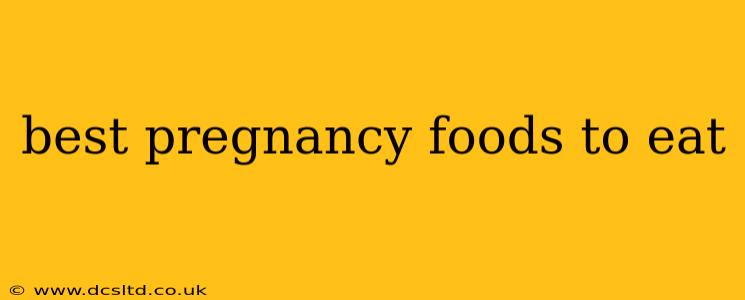Congratulations on your pregnancy! Nourishing your body with the right foods is crucial for your health and the healthy development of your baby. This comprehensive guide explores the best pregnancy foods to eat, addressing common questions and concerns. We'll delve into the essential nutrients needed during pregnancy and provide practical examples of delicious and nutritious meals.
What are the most important nutrients during pregnancy?
During pregnancy, your nutritional needs increase significantly to support both your and your baby's growth. Key nutrients include:
-
Folic Acid: Crucial for preventing neural tube defects in the developing fetus. Found in leafy green vegetables, legumes, and fortified cereals. Your doctor will likely recommend a folic acid supplement as well.
-
Iron: Essential for producing hemoglobin, which carries oxygen to your baby. Iron-rich foods include red meat, spinach, lentils, and beans. Iron absorption is improved when consumed with Vitamin C-rich foods.
-
Calcium: Vital for building strong bones and teeth in your baby. Good sources include dairy products (milk, yogurt, cheese), leafy green vegetables (kale, collard greens), and fortified plant milks.
-
Protein: Necessary for building and repairing tissues in both you and your baby. Excellent sources include lean meats, poultry, fish, eggs, beans, lentils, and tofu.
-
Iodine: Supports thyroid function, crucial for your baby's brain development. Found in iodized salt and seafood.
-
Vitamin D: Important for calcium absorption and bone health. Sunlight exposure, fatty fish, and fortified foods are good sources.
-
Omega-3 Fatty Acids: Essential for brain development and reducing inflammation. Found in fatty fish like salmon, tuna, and mackerel (in moderation due to mercury concerns). Flaxseeds and chia seeds are plant-based alternatives.
-
Zinc: Supports cell growth and development. Good sources include oysters, red meat, poultry, beans, and nuts.
What foods should I avoid during pregnancy?
While focusing on nutrient-rich foods, it's equally important to be aware of foods to avoid or limit during pregnancy:
-
Raw or Undercooked Meats and Eggs: These carry a risk of foodborne illnesses like salmonella and listeria, which can be harmful to your baby. Ensure all meats and eggs are thoroughly cooked.
-
Unpasteurized Dairy Products: These may contain harmful bacteria that can cause illness. Stick to pasteurized milk, cheese, and yogurt.
-
High-Mercury Fish: Fish like swordfish, king mackerel, and tilefish contain high levels of mercury, which can be harmful to the developing nervous system. Limit consumption of these fish.
-
Certain Types of Fish: While omega-3s are beneficial, some fish, like shark, swordfish, king mackerel, and tilefish, contain high levels of mercury. Consult your doctor or a registered dietitian for guidance on safe fish consumption during pregnancy.
-
Alcohol: Alcohol consumption during pregnancy can cause Fetal Alcohol Spectrum Disorders (FASDs), a range of physical, mental, and behavioral problems. Completely abstain from alcohol during pregnancy.
-
Caffeine: Limit caffeine intake to moderate amounts, as excessive caffeine can increase the risk of miscarriage and low birth weight.
What are some healthy pregnancy snack ideas?
Healthy snacking is key to managing hunger and ensuring consistent nutrient intake throughout the day. Here are some nutritious snack ideas:
-
Greek yogurt with berries: A good source of protein and antioxidants.
-
Hard-boiled eggs: A convenient source of protein and choline, important for brain development.
-
Trail mix (nuts, seeds, dried fruit): Provides healthy fats, protein, and fiber. Choose unsalted varieties and watch portion sizes.
-
Whole-wheat crackers with avocado: A source of healthy fats and fiber.
-
Fruits (apples, bananas, oranges): Provide vitamins, minerals, and fiber.
Are there any specific dietary needs for vegetarian or vegan pregnancies?
Vegetarian and vegan diets can be healthy during pregnancy, but careful planning is essential to ensure adequate intake of all essential nutrients. Supplementation may be necessary, particularly for iron, Vitamin B12, and Vitamin D. Consulting a registered dietitian specializing in vegetarian or vegan nutrition is highly recommended.
How can I manage morning sickness with diet?
Morning sickness can be challenging, but dietary changes can often help. Try eating small, frequent meals and snacks throughout the day to avoid an empty stomach. Choose bland foods that are easy to digest, such as crackers, toast, or rice. Avoid strong smells and spicy foods that may worsen nausea. Staying well-hydrated is also important.
What are some tips for eating healthy during pregnancy?
-
Focus on whole, unprocessed foods: Choose fruits, vegetables, whole grains, lean proteins, and healthy fats.
-
Drink plenty of water: Staying hydrated is crucial for both you and your baby.
-
Listen to your body: Pay attention to your hunger and fullness cues.
-
Consult with your doctor or a registered dietitian: They can provide personalized dietary advice and address any specific concerns.
This guide provides a comprehensive overview of healthy eating during pregnancy. Remember to consult with your healthcare provider or a registered dietitian for personalized advice tailored to your individual needs and health status. They can help you create a nutritious meal plan that supports a healthy pregnancy and a healthy baby.
